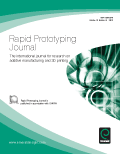
RAPID PROTOTYPING JOURNAL
Scope & Guideline
Connecting Theory and Practice in Prototyping Innovation
Introduction
Aims and Scopes
- Additive Manufacturing Technologies:
The journal covers various additive manufacturing technologies, including material extrusion, powder bed fusion, stereolithography, and binder jetting, exploring their principles, applications, and advancements. - Material Characterization and Development:
Research on new materials suitable for additive manufacturing, including polymers, metals, ceramics, and composites, with a focus on their mechanical properties, microstructures, and processing techniques. - Design for Additive Manufacturing (DfAM):
Studies on design methodologies and frameworks that optimize part performance and manufacturability in additive processes, including topology optimization and bespoke design approaches. - Process Optimization and Control:
Investigation of process parameters influencing the quality and performance of additively manufactured parts, including thermal management, layer adhesion, and defect detection. - Application in Medical and Aerospace Industries:
Research that applies additive manufacturing to critical sectors such as healthcare and aerospace, focusing on custom implants, prosthetics, and lightweight structures. - Sustainability and Recycling:
Exploration of sustainable practices in additive manufacturing, including the use of recycled materials and energy-efficient processes. - Integration with Industry 4.0:
The journal discusses the integration of additive manufacturing with digital technologies, including machine learning, data analytics, and automation for smart manufacturing.
Trending and Emerging
- Machine Learning and AI in AM:
The integration of machine learning and artificial intelligence for process optimization, defect detection, and predictive modeling is gaining momentum, showcasing the potential for smarter manufacturing solutions. - Multi-Material and Hybrid Printing:
Research in multi-material additive manufacturing is on the rise, focusing on the development of hybrid systems that combine different materials for enhanced functionalities and properties. - Bioprinting and Medical Applications:
The application of additive manufacturing in bioprinting and the production of personalized medical devices is increasingly prominent, reflecting a growing interest in healthcare innovations. - Sustainability in AM:
There is a notable trend towards sustainability, with research focusing on recycling methods, eco-friendly materials, and energy-efficient processes in additive manufacturing. - Advanced Material Composites:
The exploration of advanced composite materials, including bio-composites and functionalized materials, is trending, as researchers seek to enhance performance and application range. - Digital Twin and Industry 4.0 Integration:
The application of digital twin technology and IoT in additive manufacturing processes is emerging, emphasizing real-time monitoring, predictive maintenance, and process optimization. - 4D Printing and Smart Materials:
Research on 4D printing, which involves materials that change properties over time, is becoming increasingly relevant, particularly in applications requiring adaptive and responsive designs.
Declining or Waning
- Traditional Manufacturing Comparisons:
Research comparing additive manufacturing processes with traditional manufacturing methods has become less prevalent as the focus shifts towards unique benefits of AM, rather than direct comparisons. - Basic Process Descriptions:
Papers providing basic descriptions of additive manufacturing processes are declining, as the audience seeks more in-depth analyses, optimizations, and applications rather than introductory content. - General Reviews without Novel Insights:
Comprehensive reviews that do not present new data or insights are being published less frequently, as the journal aims for contributions that provide fresh perspectives or advancements in the field. - Limited Focus on Single Material Studies:
There is a noticeable decrease in studies focusing solely on single materials without considering their applications, hybridization, or functional enhancements, as the field moves towards more complex material systems. - Conventional Design Approaches:
Traditional design methodologies that do not leverage the unique capabilities of additive manufacturing are being overshadowed by innovative DfAM strategies that emphasize optimization and customization.
Similar Journals
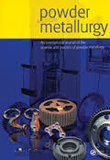
POWDER METALLURGY
Innovative Insights for Material Science PioneersPOWDER METALLURGY, with ISSN 0032-5899 and E-ISSN 1743-2901, is a prestigious journal published by SAGE Publications Inc, located in the United Kingdom. Founded in 1958, the journal has been a pivotal platform for the dissemination of innovative research and advancements in the fields of ceramics and composites, condensed matter physics, materials chemistry, and the mechanics of materials. With a commendable impact factor and consistently ranked in the second quartile across multiple categories, POWDER METALLURGY is recognized for its rigorous peer-review process and high-quality articles. The journal is an essential resource for researchers, professionals, and students seeking the latest insights and developments in powder metallurgy and allied materials science disciplines. While it does not offer open access options, readers can access a wealth of information that underscores the journal's commitment to serving as a foundational reference in the progressing landscape of materials science and engineering.

STROJNISKI VESTNIK-JOURNAL OF MECHANICAL ENGINEERING
Advancing Mechanical Engineering Knowledge Since 1974STROJNISKI VESTNIK-JOURNAL OF MECHANICAL ENGINEERING is a prestigious publication that has been disseminating cutting-edge research in the field of mechanical engineering since 1974. Published by the Association of Mechanical Engineers Technicians Slovenia, this journal serves as a critical platform for professionals, researchers, and students aiming to explore advancements in mechanical engineering and mechanics of materials. With a category ranking in the Q3 quartile for both Mechanical Engineering and Mechanics of Materials, the journal reflects a robust engagement with contemporary research and practices, contributing to the ongoing discourse within these vital disciplines. Although currently not open access, the journal is committed to providing high-quality, peer-reviewed articles that facilitate knowledge sharing and innovation. It is indexed in Scopus, maintaining respectable standings within its categories, thereby underlining its importance and impact in the global academic community.

MM Science Journal
Connecting Theory and Practice in Engineering Research.MM Science Journal is a leading publication in the fields of Automotive Engineering, Electrical and Electronic Engineering, Industrial and Manufacturing Engineering, and Mechanical Engineering, published by MM SCIENCE. Established in 2014 and spanning a converged period to 2024, this journal serves as a crucial platform for disseminating innovative research and practical applications relevant to industry professionals and academic scholars alike. With a notable Q3 ranking in multiple engineering categories and Scopus Ranks placing it in the 35th to 25th percentiles across various disciplines, MM Science Journal is committed to advancing knowledge and fostering collaboration in engineering disciplines. Although not currently an open-access publication, the journal remains instrumental for those seeking to engage with cutting-edge developments in engineering from its base in the Czech Republic. Researchers, students, and professionals are encouraged to explore the rich findings shared within its pages, contributing to the ongoing evolution of engineering practices.

Advances in Industrial and Manufacturing Engineering
Unleashing the potential of engineering through open access.Advances in Industrial and Manufacturing Engineering is a leading academic journal published by Elsevier, dedicated to the dissemination of cutting-edge research in the fields of industrial and manufacturing engineering, mechanical engineering, and the mechanics of materials. Since its inception as an Open Access journal in 2020, it has fostered a global community of scholars committed to advancing theoretical and practical applications in these dynamic areas. With a prestigious Q1 ranking in multiple engineering disciplines and impressive Scopus standings, the journal provides a platform for innovative research that bridges the gap between theory and practice. Based in the Netherlands, the journal encourages the submission of high-quality papers that explore the latest advancements and challenges in the engineering sector. Its open access model ensures that research contributions reach a broad audience, making a significant impact in academia and industry alike. As it converges from 2020 to 2024, the journal aspires to continue setting the benchmark for excellence in engineering research.

Journal of Manufacturing and Materials Processing
Unlocking the Future of Industrial EngineeringThe Journal of Manufacturing and Materials Processing is a premier *open access* journal published by MDPI since 2017, located in Switzerland. This scholarly publication provides a vital platform for sharing cutting-edge research in the fields of industrial and manufacturing engineering, mechanical engineering, and mechanics of materials. With an impressive categorization ranking in the Q2 quartile for these disciplines as of 2023, this journal not only enhances the global discourse in manufacturing and materials processing but also showcases significant contributions from researchers worldwide. Its robust positioning in Scopus rankings—placing 118th in Industrial and Manufacturing Engineering and 179th in Mechanical Engineering—underscores its impact and relevance in the academic community. As a *fully open access* journal, it ensures that all research is readily accessible, promoting greater dissemination of knowledge and fostering collaboration among scientists, engineers, and industry professionals. This makes the Journal of Manufacturing and Materials Processing an essential resource for anyone invested in the advancements of material technology and manufacturing processes.

SAMPE JOURNAL
Pioneering Knowledge in Materials and Manufacturing ProcessesSAMPE JOURNAL, published by SAMPE PUBLISHERS, has served as a pivotal source of knowledge and innovation in the field of engineering and materials science since its inception in 1969. This peer-reviewed journal is dedicated to advancing the science and application of materials and manufacturing processes, catering to the interests of researchers, professionals, and students alike. Although it does not currently offer open access options, its articles are renowned for their depth and rigor, contributing significantly to the ongoing discourse in Mechanical Engineering, General Materials Science, and Mechanics of Materials. With Scopus rankings placing it in the 38th percentile for Mechanical Engineering and 37th for General Materials Science, SAMPE JOURNAL continues to be an essential resource for those striving for excellence in their respective fields. For those invested in pioneering research and innovations, this journal remains a reliable and respected platform for publication and dissemination of knowledge.
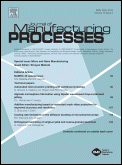
Journal of Manufacturing Processes
Unveiling Cutting-edge Research in ManufacturingThe Journal of Manufacturing Processes, published by Elsevier Science Ltd, serves as a premier platform for researchers, professionals, and students engaged in the fields of Industrial and Manufacturing Engineering as well as Management Science and Operations Research. With an impressive Q1 ranking across multiple categories for 2023, this journal not only showcases innovative research but also provides insights into strategic management and operational excellence within the manufacturing sector. Covering an extensive timeline from 1999 to 2024, the journal has solidified its position within the academic community, consistently ranking in the top percentile across various Scopus categories. Although it does not offer open access, the journal maintains a commitment to disseminating high-quality, peer-reviewed research that drives advancements in manufacturing processes. Located in the Netherlands, the journal aims to foster collaboration and knowledge sharing among scholars and industry experts alike, making it an indispensable resource for anyone dedicated to the advancement of manufacturing science.

MANUFACTURING ENGINEERING
Transforming Ideas into Manufacturing ExcellenceManufacturing Engineering is a pivotal journal specializing in the fields of Industrial and Manufacturing Engineering, as well as Mechanical Engineering, with a rich history of publication since its inception in 1975. Published by the esteemed Société des Ingénieurs de Fabrication (SME), this journal plays a crucial role in disseminating innovative research, practical applications, and emerging technologies that shape the manufacturing sector. Despite its recent positioning in the Q4 quartile rankings on Scopus, the journal serves as a platform for rigorous peer-reviewed articles that contribute to the academic dialogue and bolster advancements in manufacturing practices. The journal operates without open access options, making it an essential resource for institutions and professionals looking to stay informed within the manufacturing domain. With a dedicated audience comprising researchers, engineers, and industry professionals, Manufacturing Engineering continues to address the evolving challenges and opportunities in manufacturing, fostering an environment ripe for collaboration and exploration.
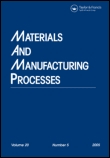
MATERIALS AND MANUFACTURING PROCESSES
Elevating Knowledge in Materials Science and Engineering Practices.MATERIALS AND MANUFACTURING PROCESSES, published by Taylor & Francis Inc, is a leading journal dedicated to the dynamic fields of materials science and manufacturing engineering. Established in 1989, the journal has built a formidable reputation, exemplified by its prestigious Q1 rankings in 2023 across various categories, including Industrial and Manufacturing Engineering, Materials Science, Mechanical Engineering, and Mechanics of Materials. With a robust focus on innovative research and the latest advancements in manufacturing techniques and materials application, the journal serves as a vital resource for researchers, professionals, and students alike. The journal is indexed in renowned databases and boasts high impact factors, reflecting its influence in the academic community. Although it does not offer open access, it provides extensive platforms for disseminating crucial findings that push the boundaries of engineering and science. For those seeking impactful research contributions, MATERIALS AND MANUFACTURING PROCESSES remains at the forefront of fostering scholarly dialogue and advancing the field.
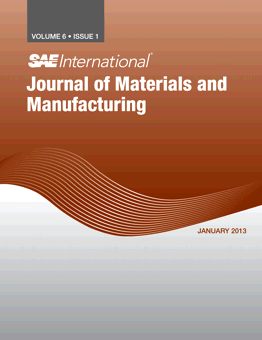
SAE International Journal of Materials and Manufacturing
Transforming Insights into Impactful Manufacturing PracticesSAE International Journal of Materials and Manufacturing, published by SAE International, is a leading peer-reviewed journal that focuses on the advancements and research in the fields of materials science and manufacturing engineering. With ISSN 1946-3979 and E-ISSN 1946-3987, this journal is an essential resource for researchers, professionals, and students who are keen on exploring innovative materials and modern manufacturing techniques. Although the journal currently does not offer open access options, its rigorous selection process ensures the publication of high-quality papers that contribute significantly to the knowledge base in the industry. Recognized within the third and fourth quartiles across various engineering categories, including Industrial and Manufacturing Engineering and Mechanical Engineering, the journal provides an impactful platform for disseminating groundbreaking research. With a converged history since 2002 and a comprehensive approach to critical topics in mechanics of materials, it empowers the academic community with vital insights, trends, and methodologies that propel the future of manufacturing excellence.